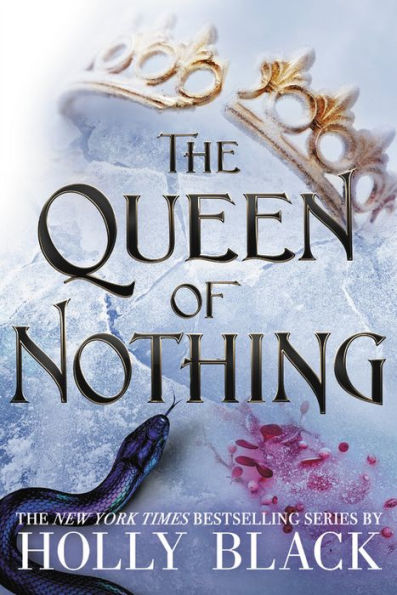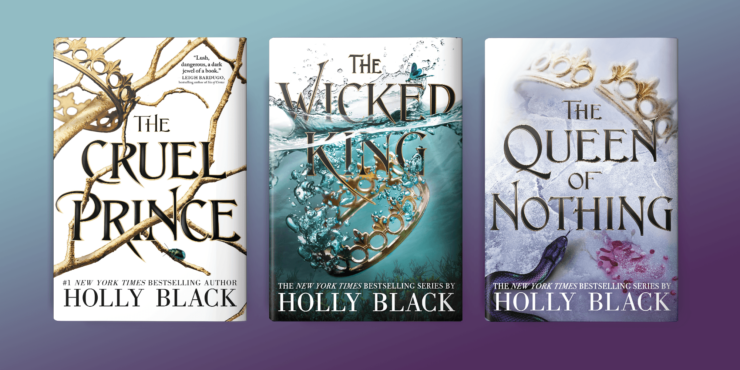The third and final book in Holly Black’s The Folk of the Air series, The Queen of Nothing, is due to land on bookstore shelves later this month—and we’ve all been waiting patiently (or not so patiently!) to read the conclusion to Jude and Cardan’s saga of power, desire, and manipulation. But since it’s been some time since the publications of the last two books, The Cruel Prince and The Wicked King, a little refresher course on the happenings therein seems appropriate to both whet our palates and bring us up to speed again.
After all, Black has a real hand at staging conflict over multiple arenas: personal and political, familial and state, across both the realms of human and faerie. Plus, there’s all the history of lovers and liars, death and desire, children and their parents: who’s on who’s side, and why, and for how long are all complicated questions that keep the reader on the edge of their seat.
The Cruel Prince sets up our cast of characters and their initial conflicts: Jude and her sister Taryn have been raised as Gentry in the faerie court despite being mortals under the protection and tutelage of their adoptive father Madoc, a redcap general with a taste and skill for war. Jude is fed up with her powerlessness and extra-done with being a toy for the other members of the court. While Taryn has decided her solution will be to marry into safety and power with a faerie spouse, Jude wants to become a knight though she’s been forbidden from it.
Her quest for knighthood leads her, however, into the violence and intrigues of court succession. Cardan, the titular prince who has tormented her constantly with his cadre of friends, is a younger family member and he isn’t due for the throne. The initial intrigue in the book is between the older princes, Dain and Balekin. Jude begins spying for Dain, but her father Madoc is working with Balekin… and then her father and Balekin assassinate Dain at a court gathering. After some investigations Jude finds out that, due to intrigues of birth and parentage, her little brother Oak is actually in line for the throne as well (as Dain’s child) and would make a better king, except he’s too young and she wants him out of faerie.
So, she hatches a plot: manipulate Cardan into making an oath to serve her to save his own skin, giving her a year and a day with him at her order. He doesn’t know her plan, and it’s a betrayal, but she then arranges a coup against Balekin to crown Cardan king while she places Oak in the mortal world for raising by her faerie sister. As I said in my initial review for the books, and I’m stealing now because I think it makes the point best: “Jude is a strategist, a warrior, and a killer. She is afraid and she is full of rage and she is willing, at whatever costs she must pay, to rise with her ambition to the highest seat of safety available to her while also salvaging the mortal/faerie realms’ balance.
And that seat of relative security, of course, is found standing behind the king she’s crowned.”
Which takes us to The Wicked King, set five months later, where Jude is struggling through the political situation she’s created with herself as spymaster/seneschal and Cardan as king. As Madoc noted: it’s easier to take a hill in battle than to hold it. Her coup worked but that was just the beginning, and Cardan is furious with her for her betrayal—he never wanted to be king. Jude and Cardan are both kids in a world of adults, running their own games with and against each other amidst a fracturing court. Blood is in the water and alliances are crumbling. Jude’s combination of impulsiveness, suspicion, and secretive maneuvering cause her problems throughout the book. She fails at key moments to communicate important information to the right people, holding back when giving forth would’ve been smarter, thereby setting herself up for extreme dangers—including capture and torture.
Because Balekin might be imprisoned but he’s still dangerous; he demands meetings with Cardan but gets Jude instead, and she finds out through a guard she takes captive that Balekin is also communicating with the Queen of the Undersea to make his own alliances and reclaim the throne. The queen’s daughter, Nicasia, was hoping to marry Cardan previously to unite the kingdoms but is now out of his favor. Jude finds this out because Nicasia almost murders Cardan out of jealousy during a botched assassination attempt, and she reveals that her mother is threatening to sink the kingdom under the sea if Cardan doesn’t consent to the marriage (therefore putting her in control).
In the meantime, Taryn is due to marry Locke—the current Master of Revels—who has been at Jude’s throat in a variety of clever and miserable ways since the first book. Ultimately, when Jude is almost hunted down and killed by a group of faerie she realizes Locke was one of them (because he bore an injury she dealt), and that Taryn has likely betrayed her. Jude returns to the prison and finds out that the woman who offered her information is Cardan’s mother Asha, but at the prison Jude is betrayed and captured–then kidnapped to Orlagh’s undersea kingdom. Orlagh and Nicasia torture her, not knowing she’s immune to many of their magics, and they “glamour” her to kill Cardan and bring Oak to them.
Buy the Book


The Queen of Nothing
After her release to be a weapon, Jude goes to Balekin; he also believes she’s loyal to him via glamour and will poison Cardan. Her father has blocked her from access to Cardan, as has the Council, so she has to—weak and wounded and sick—scale the castle to meet with him and tell him all the machinations to save his life. Balekin sets her up to be killed for poisoning Cardan at the ball, even if she herself hasn’t done the poisoning, but instead she plays her own hand to manipulate Balekin into giving her an antidote for Cardan. After that, Jude and Balekin duel… and Jude wins, killing him in fair combat. But it hardly ends there, because Black has written a high-conflict, high-tension second book if I’ve ever seen one.
The conflict with Orlagh comes to a head next. Having encountered Taryn posing as Jude to manipulate him, Cardan argues to Jude that he wanted to prove his loyalty to her and that she should release him from his oath—if she does, he’ll marry her. They’ve already been pursuing a push-and-pull emotional and sexual relationship, so she agrees to the marriage in a moment of hunger for power (and for, though she hates to admit it, something like love). He marries her and makes her queen… but then banishes her for killing Balekin, and when she claims the marriage to exempt her, he denies it and no one else knew about it to stand for her. She’s sent to the mortal realm to live with Oak and Vivi, while Cardan remains in faerie as king.
It’s wild, it’s violent, it’s twisty and turny. There’s so much I haven’t mentioned in these brief summaries: familial intrigue, trauma both personal and generational, courts upon courts upon courts, murders and deaths and imprisonments, ethical dilemmas about when it’s okay to kill someone and how. Jude is a raw, aggressive, handsome young woman protagonist—and she’s definitely scary as hell. But now she’s been removed from the seat of her power, making her The Queen of Nothing.
I can’t wait to read more about Jude in the mortal world, Cardan on the throne, and how it’s all going to resolve.
The Folk of the Air series is available from Little, Brown Books. The Queen of Nothing publishes November 19th.
Lee Mandelo is a writer, critic, and editor whose primary fields of interest are speculative fiction and queer literature, especially when the two coincide. They have two books out, Beyond Binary: Genderqueer and Sexually Fluid Speculative Fiction and We Wuz Pushed: On Joanna Russ and Radical Truth-telling, and in the past have edited for publications like Strange Horizons Magazine. Other work has been featured in magazines such as Stone Telling, Clarkesworld, Apex, and Ideomancer.










